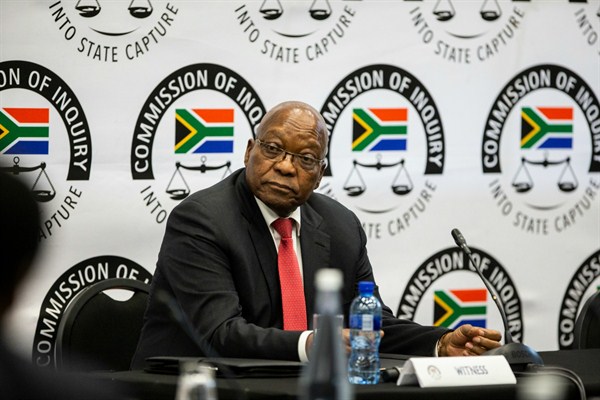Former South African President Jacob Zuma seems to have decided that given his dire circumstances, with his reputation in freefall and a corruption trial pending, attack is his best form of defense. Over two days in mid-July in Johannesburg, he appeared before the Zondo Commission, which was launched by Zuma’s successor, President Cyril Ramaphosa, last year to investigate the rampant corruption—what is known in South Africa as “state capture”—during Zuma’s troubled presidency. State capture is shorthand for how Zuma allegedly allowed close private business interests to exercise undue influence at the highest levels of government, including over appointments and dismissals at state-owned enterprises and even within his own Cabinet.
The Zondo Commission’s work poses a threat not only to Zuma but to his allies and the wider patronage networks in the ruling African National Congress that oppose the leadership of Ramaphosa, who has promised to clean things up. State capture undermined South Africa’s constitutional order, and the plundering it entailed opens up the possibility of criminal prosecutions for those involved. Zuma initially preferred to shun the anti-corruption commission entirely, because he anticipated, correctly, that his appearance at any public hearing would only further complicate his already exposed position. However, its high profile and official status as a judicial commission of inquiry meant that was not a realistic option politically, even if he was not legally required to attend. Most South Africans would also have considered any hearings into corruption during the Zuma era without the input of Zuma himself to be absurd.
So Zuma ultimately attended and testified, but went firmly on the offensive, mixing familiar arguments with some highly controversial new claims. This strategy took three forms. First, he denied everything, asserting that state capture itself was a mythical bundle of exaggerations. Second, he wrapped himself in victimhood, a familiar tactic of Zuma’s over the past 15 years. He said the allegations were merely the latest chapter in a long series of plots and smears orchestrated by his opponents—often aided by the supposedly sinister machinations of local and foreign intelligence services—to destroy him politically and cast him as “the king of corrupt people.” He claimed they included the attempt to prosecute him for corruption over an arms deal scandal of the early 2000s; his removal from the deputy presidency by then-President Thabo Mbeki in 2005; his rape trial in 2006, in which he was acquitted; and the so-called Nkandla episode in 2014, when he received a scathing indictment from the Public Protector for the misuse of public money on renovations to his private residence in KwaZulu-Natal. It all culminated with his early recall from the presidency in 2018.

